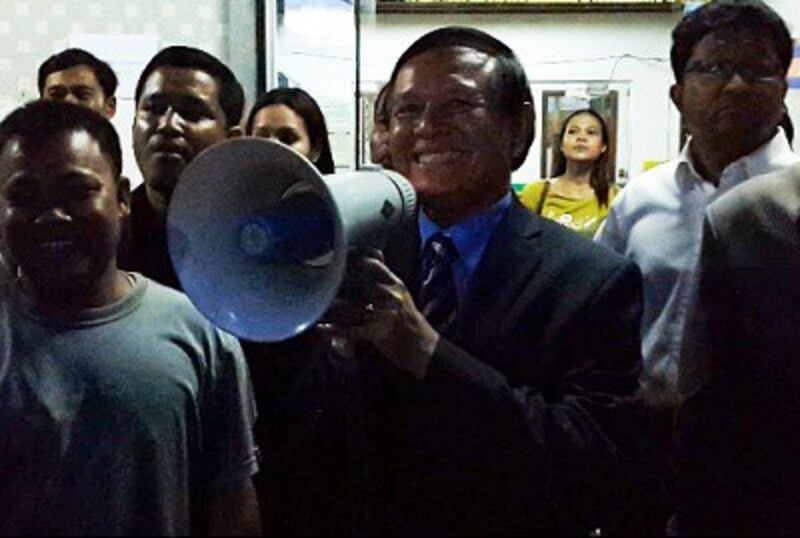Cambodian Prime Minister Hun Sen pushed through a law in parliament Friday that makes it a crime to deny atrocities committed by the notorious Khmer Rouge regime, with lawmakers voting on it in the absence of opposition MPs who were expelled after forming a new party.
The law was hurriedly drafted and passed in Hun Sen’s party-dominated National Assembly amid speculations the government plans to frame charges against a top leader of the new Cambodian National Rescue Party (CNRP) ahead of national elections next month.
Eighty-six lawmakers from Hun Sen’s ruling Cambodian People’s Party (CPP) and its ally Funcinpec voted unanimously in favor of the law in the 123-member National Assembly, the country’s lower house of parliament.
None of the 29 opposition party members were present at the session, after being dismissed this week by the National Assembly’s CPP-run permanent committee for leaving their original parties—the Sam Rainsy Party and the Human Rights Party—to form the CNRP coalition.
The CPP and Funcinpec lawmakers offered no push-back on the law, offering instead praise for it before raising their hands to approve it at the end of an hour-long session.
The law, which bans statements denying crimes by the brutal 1975-79 Khmer Rouge regime and carries a sentence of up to two years in jail, was drafted last week amid controversy over comments about the Khmer Rouge allegedly made by CNRP deputy president Kem Sokha.
The Cambodian pro-government media have in recent weeks carried remarks attributed to Kem Sokha saying that the infamous Tuol Sleng prison, also known as S-21, was not run by the Khmer Rouge and was instead an invention of the Vietnamese invaders who ousted the regime.

Kem Sokha's party has said his words were "twisted" out of context.
The prison’s commander, who was found guilty by a U.N.-assisted genocide tribunal, has confessed that Tuol Sleng was a Khmer Rouge torture center.
Senior CPP parliamentarian and National Finance Committee Chairman Cheam Yeap said at the National Assembly session that he “warned” Kem Sokha to watch his words about the Khmer Rouge era.
“The law will … impose punishments against those individuals who refuse to acknowledge atrocities during Democratic Kampuchea regime,” he said, using a term for the Khmer Rouge state.
Dismissed from their posts
CNRP members said they were not invited to attend Friday’s session and had not received formal notification of their dismissal.
Addressing the National Assembly, senior CPP member Chheang Vun confirmed publicly that the CNRP members had been expelled, saying parliament should ignore a request CNRP had made to delay the vote.
“We shouldn’t accept any recommendations [from the opposition party] because they are no longer parliamentarians,” said Chheang Vun, who is chairman of Foreign Affairs and International Cooperation Commission and a member of the assembly’s powerful permanent committee.
The CNRP had requested the vote be delayed until after a new National Assembly is formed following the July 28 elections.
It said in a statement Friday that it was “very disappointed” the assembly had refused to delay and that the approval of the law was invalid.
CNRP member Chea Poch, a dismissed Sam Rainsy Party lawmaker, said that the vote and the dismissal of opposition members by the assembly were an abuse of democratic principles.
“We have been sacked without being informed,” he told RFA’s Khmer Service.
“The National Assembly is working to please itself regardless of what is right or wrong,” he said.
CNRP spokesman Yim Sovann said Friday that in expelling lawmakers, the National Assembly had stolen votes for the CPP.
“Lawmakers are chosen by the vote of the people,” he told RFA’s Khmer Service.
“The assembly’s sacking of 29 lawmakers will affect millions of voters who voted for the opposition parties.”
He said that according to Cambodia’s laws, the CNRP lawmakers should maintain their status until the new National Assembly is formed after the July vote.
Urging calm
Kem Sokha, who returned to Cambodia on Friday after a trip to Singapore to meet with exiled CNRP president Sam Rainsy, told crowds who came to greet him that the party’s supporters must stay calm amid any attempts to discredit the CNRP.
“We want freedom, democracy, and peace. So we must have peace for all Cambodians,” he said.
Kem Sokha and Sam Rainsy were earlier scheduled to meet in Bangkok, but Sam Rainsy was refused entry to Thailand this week because of concerns he would criticize Hun Sen's government ahead of the elections.
Sam Rainsy is living in self-imposed exile in France and faces an 11-year prison sentence in Cambodia on charges critics say are politically motivated. The CNRP has urged Hun Sen’s government to allow Sam Rainsy’s unconditional return ahead of the July vote, saying the election cannot be free or fair without him.
The purported remarks attributed to Kem Sokha have provoked outrage among survivors of the Khmer Rouge, which has been held responsible for the deaths of up to two million people during its reign of terror under Pol Pot.
Hun Sen was once a Khmer Rouge cadre himself, and his political allies include people linked by experts to Khmer Rouge atrocities.
Reported by Morm Moniroth and Samean Yun for RFA’s Khmer Service. Translated by Samean Yun. Written in English by Rachel Vandenbrink.
